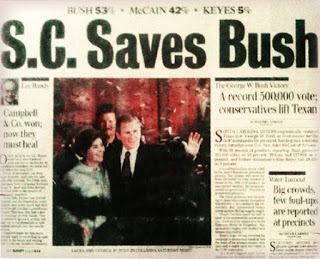 |
| Dirty tricks helped Bush beat McCain in 2000 |
Excerpt from Front Row Seat at the Circus: One Journalist’s Journey through two Presidential Elections by Jim Heath:
To say the return to South Carolina in 2006 was painful for John McCain is an understatement. Six years earlier, he had arrived in the Palmetto State after beating Texas governor George W. Bush by nineteen points in the New Hampshire primary. Bush’s one-time fifty-point lead in South Carolina had evaporated, and a win by McCain would have likely propelled him into the Republican nomination and a general election win (the Democrats had held the White House for eight years and rarely does the same party win three presidential elections in a row).
With McCain’s fortunes rising, a conservative and evangelical coalition devised a smear campaign against him that is still discussed by political strategists everywhere.
There were first rumors floated that McCain had fathered an illegitimate black child. Then, rumors he had slept with prostitutes and given his wife V.D. A third rumor suggested McCain was ‘mentally unstable’ after returning from Vietnam.
All of them patently untrue.
Christian-fundamentalist Bob Jones University in Greenville—with a controversial long-standing ban on interracial dating—played a huge role in turning out the evangelical vote. Texas governor George W. Bush accepted the university’s invitation to address hundreds of voters before the primary telling the crowd, “it feels a lot warmer here in the state of South Carolina if you know what I mean.” McCain was told to stay away and he replied angrily, “If I had been invited I would have told them to get out of the 16th century and into the 21st century. What you’re doing is racist and cruel. Governor Bush went there and never said a word. I would never, ever do such a thing.”
McCain must have hit a nerve because the university quietly ended the ban a few months later.
Rumors about McCain “siring children without marriage” were being spread by a bible professor at Bob Jones. Flyers were being distributed with a picture of a little black girl with the McCain family—leaving it to the imagination rather than the truth that she had been adopted after his wife Cindy met her during a relief mission in Bangladesh.
Most of the gossip, reporters learned later, was being provided to the evangelical right by Karl Rove, Bush’s top strategist. While researching the ugliness of the primary fight, Dr. Eddie Dyer of Coastal Carolina University told me, “The allegations have never been proven so you can classify them as scurrilous, but that took McCain out of the race.”
On primary day, Bush beat McCain by eleven points backed by a huge voter turnout in the conservative upstate. McCain, with clinched teeth in Charleston, told supporters, “I want the presidency in the best way, not the worst way. I won’t take the low road to the highest office in the land.”
Several months later, after he had dropped out of the race, a subdued McCain told supporters his biggest regret from his 2000 campaign was not publicly calling on South Carolina to remove the confederate flag from the statehouse grounds in Columbia. “I feared that if I answered honestly, I could not win the South Carolina primary. So I chose to compromise my principles. I broke my promise to always tell the truth.”
(South Carolina would remove the controversial flag fifteen years later, after nine African Americans were murdered by a white man in a church in Charleston.)
So here we were six years later waiting to interview McCain in a state that had created such bitter memories, and just a stone’s throw away from Bob Jones University.
McCain sat down, and after we discussed the irony of crossing paths again in South Carolina, I began by asking about Bob Jones University and the wounds left over from the 2000 race.
“After we were defeated here I slept like a baby—sleep for two hours, wake up and cry—sleep for two hours, wake up and cry,” he laughed.
McCain insisted that he held no lingering animosity with the evangelical activists and instead suggested that Rove was the main culprit. “I was defeated here in 2000 not by religious conservatives, although that was certainly part of it, but I was defeated by the Republican establishment. Bush had the entire Republican establishment behind him and all the money that entails.”
Jim Heath covered two presidential election cycles in South Carolina. Continue reading at Front Row Seat at the Circus: One Journalist’s Journey through two Presidential Elections.
